undocumented
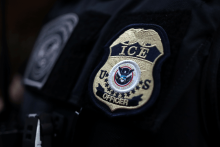
Sara arrived in the United States as a 7-year-old refugee when her family fled religious persecution in Bangladesh. Eleven years later, Sara now calls Montgomery County, Md., home. But if the Trump administration has its way, she would be immediately deported because of her undocumented status.
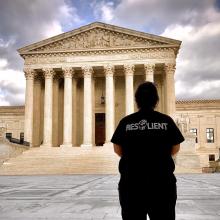
I have been called “illegal” most of my life. Coming to the United States without legal authorization somehow made me “illegal,” less than, and undeserving of basic human rights. To cope with it, I bought into the lie of merit: If I simply worked hard enough and did all the “right” things, I would become worthy. I always strived to be “good” — to not break any laws and to focus on school. But still — my worthiness never came.
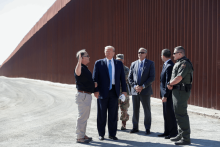
The administration is pursuing every tactic at its disposal – many of which have been temporarily stalled by the courts – to impede the path to citizenship and to reduce legal immigration avenues to the U.S.

Trump is fighting the battle on two fronts, trying to stop migrants from coming in the first place and deporting those who have been released into the United States.
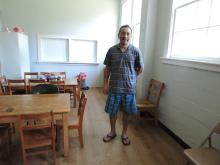
Oliver-Bruno is one of six people publicly in sanctuary in the state (a seventh doesn’t want to be identified). During the 1980s, more than 100 churches sheltered Guatemalan and Salvadoran immigrants, and the movement has seen somewhat of a national revival in recent years. Though sanctuary churches often attract media attention, the men and women living behind church doors represent a network of families and communities living under the unpredictable threat of government-sponsored raids and arrests.

"Imagine your family ripped apart. That’s going to have reverberations across family members for years to come."

LAST SUMMER, THE FUTURE of for-profit prisons seemed bleak. The U.S. Department of Justice announced it would begin phasing out its use of privately run prisons and the U.S. Department of Homeland Security quickly followed suit, declaring that it would reconsider its use of privately run detention centers. Stocks for companies that ran for-profit prisons plunged.
But then Donald Trump was elected president, and private prison stocks immediately soared. The nation’s largest prison company, CoreCivic (formerly Corrections Corporation of America), reported a boost of more than 40 percent in the value of its shares. Given Trump’s promises to “create a new special deportation task force,” investors bet that privately run detention centers will play a key role.
And the investors may be right. Every year, DHS detains about 400,000 undocumented immigrants in 250 centers nationwide, and 62 percent of the beds in these centers are operated by for-profit corporations.
According to Maria-José Soerens, a licensed mental-health counselor serving undocumented immigrants in Seattle, there are two major problems with for-profit detention centers. First, for-profit centers are not held accountable to the standards that govern federally run centers. In her work in these centers, Soerens has heard complaints ranging from a lack of medical attention to inadequate opportunities for parent-child visitation; one young woman who was having suicidal thoughts was kept in solitary confinement until she told guards she was “better.”
But the deepest problem, explains Soerens, is that most detention centers only exist because corporations saw a “business opportunity.” Beginning in the early 2000s, for-profit prison companies successfully lobbied Congress to expand drastically the number of beds in the immigration detention system—a move that doubled the revenue of the two largest for-profit prison companies. In 1998, there were 14,000 beds available for immigrant detention; today, there are 34,000.
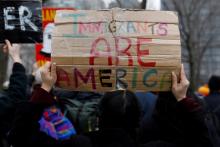
“DACA’s rescission was arbitrary and capricious because the Department failed adequately to explain its conclusion that the program was unlawful,” Bates wrote in his opinion statement released Tuesday. “Neither the meager legal reasoning nor the assessment of litigation risk provided by DHS to support its rescission decision is sufficient to sustain termination of the DACA program.”
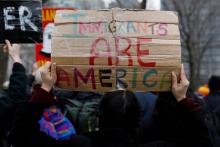
In the wake of the Supreme Court ruling that delayed the Trump administration's March 5 deadline, leaders from the National Latino Evangelical Coalition, Esperanza, Christian Community Development Association, Bread for the World, as well as U.S. Catholic bishops referenced Matthew 25 to address the biblical calling to "treat the immigrant with dignity, respect and love, providing the same welcome that we ourselves would hope for."
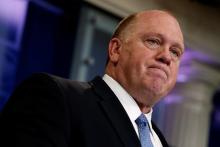
The operation would go after people who have been identified as targets for deportation, including those who have been served with final deportation orders and those with criminal histories, the source said. The number could tick up if officers come across other undocumented immigrants in the course of their actions and make what are known as collateral arrests.
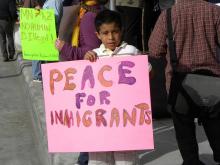
The study “highlights how policies can have effects far beyond, perhaps, the individuals that are targeted by those policies,” Samantha Artiga, director of Kaiser’s Disparities Policy Project and co-author of the study, said. “We really hear how those feelings of fear and uncertainty have impacts on their health.”

Real people, with real stories, and real families are trembling in fear for the future of their families and, in some cases, their own lives. For those of us who follow Jesus, our faith must inform our citizenship — not the inverse. It's time for us to ask better questions, seek deeper understanding and accompany our neighbors— whether local or global — who are navigating the scariest moments of their lives.
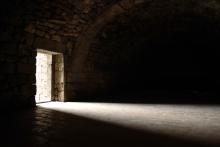
“Are we going to have to worry about ICE agents swooping down on our clients on distribution day?” he said. “What if my congregation chose to offer sanctuary to an immigrant facing deportation? Would we have to worry about immigration officers and sheriff’s deputies kicking down our front door?”
Bishop Mark Beckwith, who heads the Episcopal Diocese of Newark in New Jersey, says at least 10 of the 100 congregations in his diocese have parishioners who are affected by the new policies. He described a heightened sense of urgency as his diocese investigates what its collective response should be.
“What is so upsetting about this is we don’t know what a safe space is,” he said, citing uncertainty about whether the traditional status of churches as sanctuaries will be respected. “We need to move as fast as these executive orders are moving. That’s the challenge. We are grounded in our biblical faith and we need to respond.”
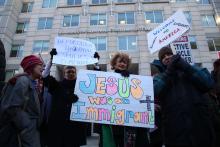
“The practices of Immigration and Customs Enforcement right now are not in line with who we say we are as a government and a country,” Kumpf said. “What they did was legally on the line of violating the Sensitive Locations Memo. That’s extraordinarily morally reprehensible.”
Drafted in 2011, the Sensitive Locations Memo places restrictions on ICE enforcement in sensitive locations such as schools, places of worship, and hospitals. Many at the gathering felt that the sensitive lines of sanctuary were crossed on the morning of the Feb 8.

First came the mayors of New York, Chicago, and Seattle declaring their cities “sanctuaries”, and saying they will protect undocumented immigrants from President-elect Donald Trump’s plan to deport them.
Then thousands of students, professors, alumni, and others at elite universities, including Harvard, Yale, and Brown, signed petitions, asking their schools to protect undocumented students from any executive order.
Now, religious congregations, including churches and synagogues, are declaring themselves “sanctuaries” for immigrants fleeing deportation.

As an immigrant woman and a Christian, I’ve loved the book of Ruth ever since I realized Ruth was an immigrant, welcomed into the family of God. And I’ve often been surprised by the interpretations of the Biblical story, in which Boaz is the hero and no one else has any agency. I find this odd because, as I read Ruth, what I see is that Boaz did nothing more heroic than exactly what was required by God’s law: He welcomed an immigrant from a neighboring community.
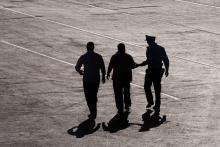
When you turn on the faucet in Flint, Mich. you don’t just get water — you also get the potent neurotoxin lead. And without a driver’s license, Flint residents are being refused bottled water from the city, so undocumented people have to search elsewhere for clean water, reports America magazine. Deacon Omar Odette of Our Lady of Guadalupe Parish in Flint says that members of his parish have been arrested by immigration authorities for not having documentation.

Rosa Robles spent 461 days inside a Tucson, Ariz., church after receiving a deportation order that would have separated her from her husband and children.
She has finally received an assurance from the federal government that she will not be deported, so on Nov. 11, she left the church for the first time in over one year.

Historically, the United States has said as long as you were born here, you are from here — a principle called birthright citizenship. It doesn’t matter who your parents are or what your family history is — as long as you were born on U.S. soil you are a citizen. This was codified in the 14th Amendment, which sought to finally grant citizenship status to African Americans living in the United States rather than leaving them in legal limbo.
A hearing on the House Judiciary Committee’s Subcommittee on Immigration and Border Security last Wednesday explored ways to change this tradition of birthright citizenship pointing to ostensible problems with pregnant women travelling to the U.S. specifically for the purpose of giving birth as well as what the committee sees as substantial public support for moving away from it.
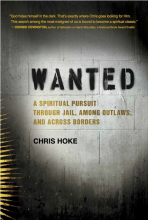
Wanted: A Spiritual Pursuit Through Jail, Among Outlaws, and Across Borders is non-fiction, but I read it like it was one of the latest blockbuster novels, this time with gorgeous writing. I couldn’t put it down, and I didn’t want the journey to end, following Chris Hoke through jails and streams and farms of Washington’s Skagit Valley as he grew from a young man interested in faith outside the walls of the church to a pastor to the “homies” of the area, as they called themselves—men whose criminal past or undocumented status have caused them to be among the most marginalized in our society. This book is imbued with dignity, prayer, and an understanding that relationships require forgiveness, on both sides. Wanted is a beautiful reflection on what the life of faith looks like in action.
Hoke grew up in southern California but was drawn to the dimmer corners of the Christian faith. He made his way to northwest Washington state to work with Tierra Nueva, a ministry that “seeks to share the good news of God’s freedom in Jesus Christ with people on the margins (immigrant, inmates, ex-offenders, the homeless).” We recently chatted about his work with Tierra Nueva, the value of a good metaphor, and how reading the Scriptures in prison can make them new.